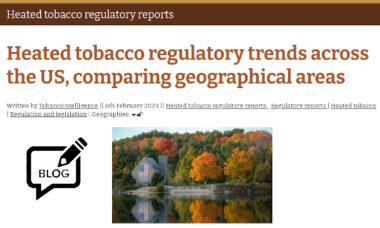 So much attention is given to the edicts and travails of the federal Food and Drug Administration (FDA) in the US that it’s easy to forget individual states – not to mention cities – can have a big impact on the regulation of novel nicotine products too. But this is brought home vividly in some new research conducted by our regulatory analysis team, which sought to establish whether there are patterns to heated tobacco regulation in different regions of the US.
So much attention is given to the edicts and travails of the federal Food and Drug Administration (FDA) in the US that it’s easy to forget individual states – not to mention cities – can have a big impact on the regulation of novel nicotine products too. But this is brought home vividly in some new research conducted by our regulatory analysis team, which sought to establish whether there are patterns to heated tobacco regulation in different regions of the US.
Their report, just published, goes into fascinating and granular detail. The big picture is that the Northeast is the most restrictive part of the country and the Midwest the least, although it may surprise many that – despite the association of California with stringent anti-tobacco laws – the West as a region is relatively inactive in several key areas of regulation.
The report splits the country into four geographical zones, and examines four areas of law in each: taxation, product restrictions, retail channel and youth access restrictions, and advertising restrictions. It’s well worth a read, but it’s even more worth a think…because one of the things implied by this report, and a similar one we recently published on our sister service ECigIntelligence, is that regulation of heated tobacco and other new nicotine products does not exist in a vacuum.
For example, northeastern states have strict controls on sale to minors, but that’s because all of them enacted Tobacco 21 (T21) before federal law introduced a minimum purchase age of 21 anyway. And T21 covers all tobacco and nicotine products.
How regulators can fall into category errors
Of course the federal regulation that took effect in 2019 should make state-to-state disparities irrelevant anyway, but the existence of state-level laws is still a useful indicator of attitudes – and, in the case of T21, a useful reminder that much of the regulation affecting heated tobacco is aimed at the whole of the tobacco and nicotine markets, not only this specific category.
Much the same often applies to taxation. And it is illustrated, too, by the strong similarities between our analyses of state-level regulation for heated tobacco and for e-cigarettes. Those of us who deal with these products every day tend to be very aware of the differences between the categories, yet regulators may not be.
An important takeaway here is that, while people in the industry, public health and advocacy groups can spend time fretting about precise positions on the continuum of risk, those in power (or those with the power to shape opinions) frequently don’t know or don’t care. They are often inclined to lump all tobacco products together without much regard for the finer nuances – and this, of course, creates challenges for those who are pushing for liberal regulation.
Variations in risk are fundamental to the proposition of novel nicotine products, and – at the extreme – nobody wants to find themselves arguing, by implication, in favour of smoking when what they really want to support is heated tobacco…
It will be interesting to see what the forthcoming third annual survey of Members of the European Parliament (MEPs) by our sister service, ECigIntelligence, reveals in this regard. Do Brussels lawmakers from 27 countries differ on the regulation of new nicotine products as much as their counterparts in 50 American state capitols do…and what distinctions do they draw among product categories?
– Barnaby Page TobaccoIntelligence staff







